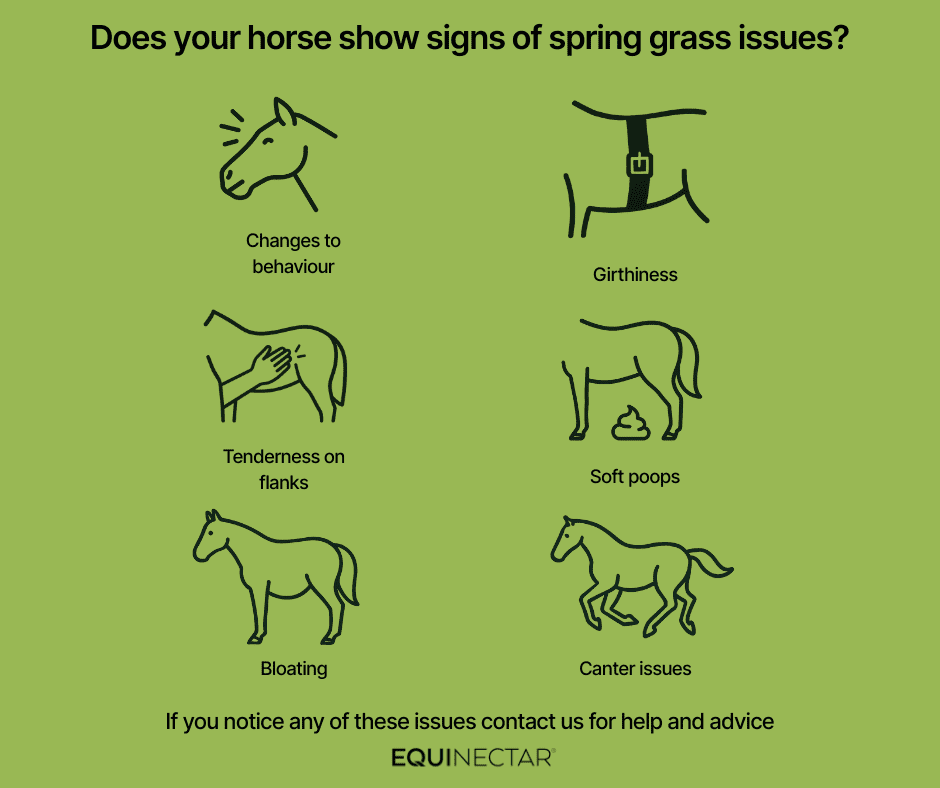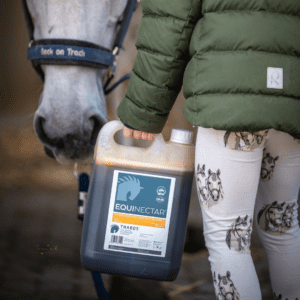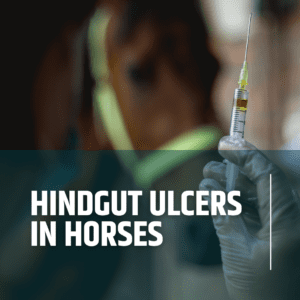01
Introduction
Spring is a beautiful season—the days grow longer, paddocks transform from muddy patches to lush green expanses, and our horses finally have fresh grass to enjoy. But for many equines, this seasonal bounty isn't the treat it appears to be. The sudden change from winter forage to sugar-rich spring grass can create significant digestive challenges, often manifesting in subtle ways that are easy to miss if you don't know what to look for.
02
The Spring Grass Challenge
When winter transitions to spring, grass growth accelerates dramatically. This rapid growth creates a surge in fructan levels that many horses struggle to process properly. For horses with sensitive digestive systems, this dietary shift can disturb the delicate microbial balance in the hindgut, potentially leading to discomfort and behavioural changes.
What makes this particularly challenging is that many horses absolutely love spring grass—they'll happily gorge themselves on it despite it causing them digestive upset.
Every horse reacts differently to seasonal changes. Our team offers customised advice for your specific horse's needs. Reach out today and let us help you navigate this challenging transition period.
03
Six Subtle Signs Your Horse May Be Struggling

If you've noticed changes in your horse recently, spring grass might be the culprit. Here are six key indicators to watch for:
1. Changes to Behaviour
Has your usually placid gelding become irritable or anxious? Perhaps your mare seems unusually sensitive or reactive under saddle? Digestive discomfort can significantly impact a horse's temperament. If your horse seems "not quite right" behaviourally, it's worth considering whether spring grass could be contributing to their mood changes.
2. Girthiness
Does your horse pin their ears, swish their tail, or even attempt to nip when you're tightening the girth? While girthiness can have various causes, it commonly indicates abdominal discomfort. If this behaviour is new or has worsened since the grass has come through, it could be a sign that your horse's digestive system is feeling the strain.
3. Tenderness on Flanks
Try gently pressing on your horse's flanks—the area behind the ribs and in front of the hindquarters. A horse with digestive discomfort might flinch, step away, or show other signs of sensitivity. This tenderness often indicates gas build-up or inflammation in the hindgut, which can be directly linked to dietary changes like spring grass consumption.
4. Soft Droppings
Keep an eye on your horse's droppings—they're an excellent indicator of gut health. If you're noticing looser, softer droppings or even mild diarrhoea, this suggests that your horse's digestive system is struggling to process its feed efficiently. The high moisture and sugar content in spring grass can rapidly alter dropping consistency.
5. Bloating
Does your horse look unusually round through the barrel? Bloating occurs when fermentation in the hindgut produces excess gas. This can be uncomfortable for your horse and is often linked to dietary factors, particularly the sudden introduction of rich spring grass. A bloated appearance that fluctuates throughout the day may suggest digestive disruption.
6. Canter Issues
Perhaps one of the most overlooked signs of hindgut discomfort is difficulty with the canter. Your horse might struggle to strike off correctly, show unexpected stiffness, or seem reluctant to maintain the gait. This often happens because canter requires greater abdominal engagement, which can be uncomfortable when the hindgut is feeling sensitive.
While none of these signs alone definitively points to spring grass as the culprit, when you notice several signs appearing together as the paddocks green up, it's time to consider digestive health as a potential factor.
Seeing multiple signs? You don't have to figure it out alone! Our team can help you connect the dots and develop a comprehensive support plan. Reach out today for personalised guidance.
04
Why Does Spring Grass Affect Some Horses More Than Others?
The impact of spring grass varies significantly between horses. Some factors that influence sensitivity include:
- Individual gut microbiome: Every horse has a unique population of gut bacteria, with some naturally maintaining better balance than others
- Previous digestive issues: Horses with a history of colic, ulcers, or other digestive problems often have more sensitive systems
- Breed predispositions: Some breeds, particularly Thoroughbreds and finer-built horses, tend to have more reactive digestive systems
- Age: Older horses sometimes struggle more with dietary transitions
For sensitive horses, the rapid fermentation of spring grass can disturb the microbial balance in the hindgut, leading to increased acidity, inflammation, and discomfort. These changes then manifest in the behavioural and physical signs outlined above.
Is your horse particularly sensitive to dietary changes? Our team understands the unique challenges of managing sensitive equines. Contact us for a personalised risk assessment and prevention strategy tailored to your horse's specific profile.
05
Supporting Your Horse Through Spring
If you've recognised some of these signs in your horse, don't panic—there are several effective approaches to help manage the transition to spring grazing:
- Gradual Introduction
Limit initial exposure to spring grass by using a grazing muzzle or restricting turnout time. Gradually increase access over several weeks to allow your horse's digestive system to adjust.
- Maintain Fibre Intake
Ensure your horse has access to good quality hay or haylage even when out on spring grass. This helps maintain a healthy fibre balance in the diet and dilutes the impact of the rich grass.
- Consider Digestive Support
Products containing active digestive enzymes can help your horse process the changing forage more effectively. Enzymes such as amylase, cellulase, and fructanase directly target the complex sugars found in spring grass that often cause digestive upset.
EquiNectar provides these essential enzymes, supporting your horse's natural digestive processes during challenging seasonal transitions. The active enzymes work to break down the complex sugars in spring grass that can otherwise ferment in the hindgut and cause discomfort.
- Regular Movement
Consistent exercise helps stimulate gut motility and can reduce gas build-up. Even gentle activity like in-hand walking can be beneficial if riding isn't possible.
06
When to Seek Help
Early intervention makes a significant difference in resolving spring grass-related issues. If your horse is showing several of the signs we've discussed, don't adopt a "wait and see" approach—problems can escalate quickly, potentially leading to more serious conditions like colic.
Consider reaching out to our team who can provide tailored advice based on your horse's specific symptoms and circumstances. Many digestive issues respond well to targeted management changes, and getting expert input early can save both your horse's discomfort and your worry.
Don't wait until minor symptoms become major problems! Our team is just a call or email away, ready to provide immediate guidance and support. Contact us at the first sign of digestive discomfort - early intervention is key to preventing more serious conditions.
07
Final Thoughts
Spring should be a joyful season for both you and your horse. By recognising the subtle signs of grass-related digestive discomfort early and taking appropriate action, you can help your equine partner enjoy the benefits of spring without the drawbacks.
Remember, every horse is unique - what works for one may not work for another. The key is close observation, appropriate management, and seeking knowledgeable support when needed.
Not sure if spring grass is affecting your horse? Don't hesitate to reach out to our team for tailored advice suited to your horse's specific needs. We're here to help you identify the root causes of your horse's discomfort and suggest targeted solutions to get them feeling their best again.
ABOUT EQUINECTAR
Description
EquiNectar® is a natural feed supplement, that is scientifically proven to:
- Re-balance your horse’s gut bacteria
- Help your horse maximise benefits from its feed
- Improve your horse’s condition
More information
EquiNectar® is produced by Tharos Ltd in the UK. It is a natural source of digestive enzymes and contains only the following ingredients:
- Our patented enzyme rich malt extract
- Medium chain triglycerides (from coconut oil)
- Potassium sorbate
For more details of the enzymes within EquiNectar® take a look at the ingredients and enzymes page.
How to feed
Simply add EquiNectar® to your horse's daily feed, using the Feeding Rate chart to determine the correct amount.
For detailed instructions about how to introduce EquiNectar, please read the comprehensive Feeding Guide page.







